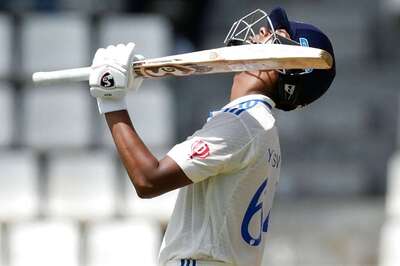
views
Boston: Greater Boston’s transportation agency proposed a series of public transit cuts Monday that officials say are needed after ridership plummeted when the COVID-19 pandemic hit earlier this year.
Weekend commuter rail services, 25 bus routes, all ferry service, and subway service after midnight would be eliminated under the proposal unveiled Monday.
Last month, the Metropolitan Bay Transportation Agency had 330,000 trips on an average weekday, down from the 1.26 million daily trips it had prior to the pandemic. Despite the drop in demand, the MBTA is still providing the same level of service something officials said is unsustainable.
I want to reassure our riders that these service changes are not permanent, do not include any fare changes, and will not take effect immediately, MBTA General Manager Steve Poftak said in a written statement. We need to reduce service where its not being used and, more importantly, we need to ensure equity and focus our available resources on those who depend on us most for reliable service.
Other cities are weighing service cuts as well.
In New York, the Metropolitan Transportation Authority has said subway and bus service could be cut as much as 40% and regional rail service could be reduced as much as 50% if it doesnt receive the federal funds it seeks.
For the MBTA, the goal is to continue to provide sufficient service for the current, reduced ridership on all modes except the ferry system, which is being proposed to be temporarily closed, officials said.
The vast majority of MBTA service will continue, and these service adjustments are being proposed to preserve and protect service for those who depend most critically on the MBTA, Massachusetts Transportation Secretary Stephanie Pollack said.
Ridership on the Red, Orange, Blue, and underground Green Line stations is currently about 24% of its pre-COVID numbers.
Under the proposal, weekday and Saturday service on subway and rapid transit lines would operate from 5 a.m. to midnight (currently until 1 a.m.) and Sunday service would operate from 6 a.m. to midnight (currently until 1 a.m.). The plan would also reduce peak frequency by 20% and reduce off-peak frequency by an additional 20% on all lines.
Ridership on buses is about 41% of its pre-COVID average.
Under the plan, 80% of essential bus routes would continue to operate as frequently as they currently do and in some cases more frequently than in pre-COVID days; 60 non-essential bus routes would operate 20% to 30% less frequently, 10 routes would be consolidated or restructured; and 25 routes would be eliminated.
Ridership on the commuter rail is approximately 13% of pre-COVID days. The plan calls for no evening service after 9 p.m., no weekend service and decreased weekday peak service. The changes would not apply to the Fairmount Line.
Public transit activists urged the MBTA to hold off on any permanent service cuts and urged Beacon Hill to help protect the public transit system.
The MBTA has proven itself as an essential service through the pandemic, and it will be essential to the Commonwealths economic recovery,” Angela Johnson-Rodriguez of the group Transportation for Massachusetts said in a statement. We need the State Legislature to step up to prevent drastic cuts that will leave people stranded.
The Boston City Council passed a resolution last week opposing MBTA service cuts.
The proposed service changes would not take effect immediately. Some service changes on the commuter rail and ferry could take place as early as January 2021, while the changes to rapid transit would be made in the spring 2021 and to buses later in the summer.
Service levels will be reassessed based on the status of the pandemic, commuting patterns, and ridership and fare revenue recovery in 2021 and beyond. The MBTA is also proposing service packages that would include options to increase service once ridership returns and the Ts revenue improves.
Riders and others can view the proposals and offer their feedback through a public engagement process, which runs through December 4.
Disclaimer: This post has been auto-published from an agency feed without any modifications to the text and has not been reviewed by an editor
Read all the Latest News, Breaking News and Coronavirus News here




















Comments
0 comment